Applied Ethics and Sustainability Report: Case Studies Analysis
VerifiedAdded on 2023/06/10
|7
|1497
|439
Report
AI Summary
This report examines applied ethics and sustainability through two case studies: Stone & Wood brewery and The Pizzeria. The Stone & Wood case study explores responsible business themes, business strategies, and the company's commitment to sustainability, including its focus on clean energy, local operations, and reducing its environmental footprint. The Pizzeria case study analyzes the ingredients and production of a margarita pizza, identifying raw material inputs, energy consumption, and waste outputs. It suggests improvements for sustainable pizza design and production, as well as addresses an ethical dilemma faced by the pizzeria owners. The report provides recommendations to resolve the ethical conflict, along with references to support the analysis. The report offers practical insights into sustainable business practices and ethical decision-making.
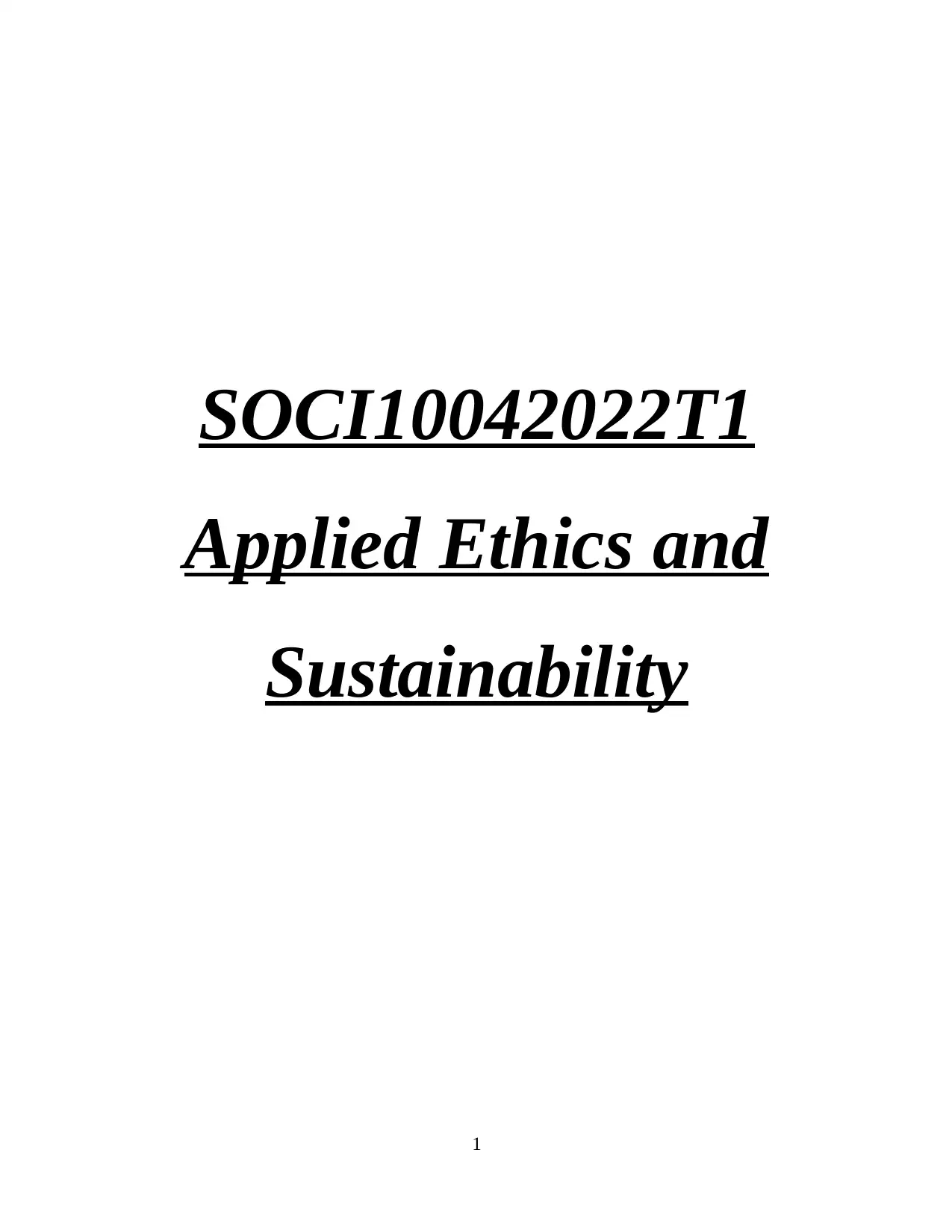
SOCI10042022T1
Applied Ethics and
Sustainability
1
Applied Ethics and
Sustainability
1
Paraphrase This Document
Need a fresh take? Get an instant paraphrase of this document with our AI Paraphraser
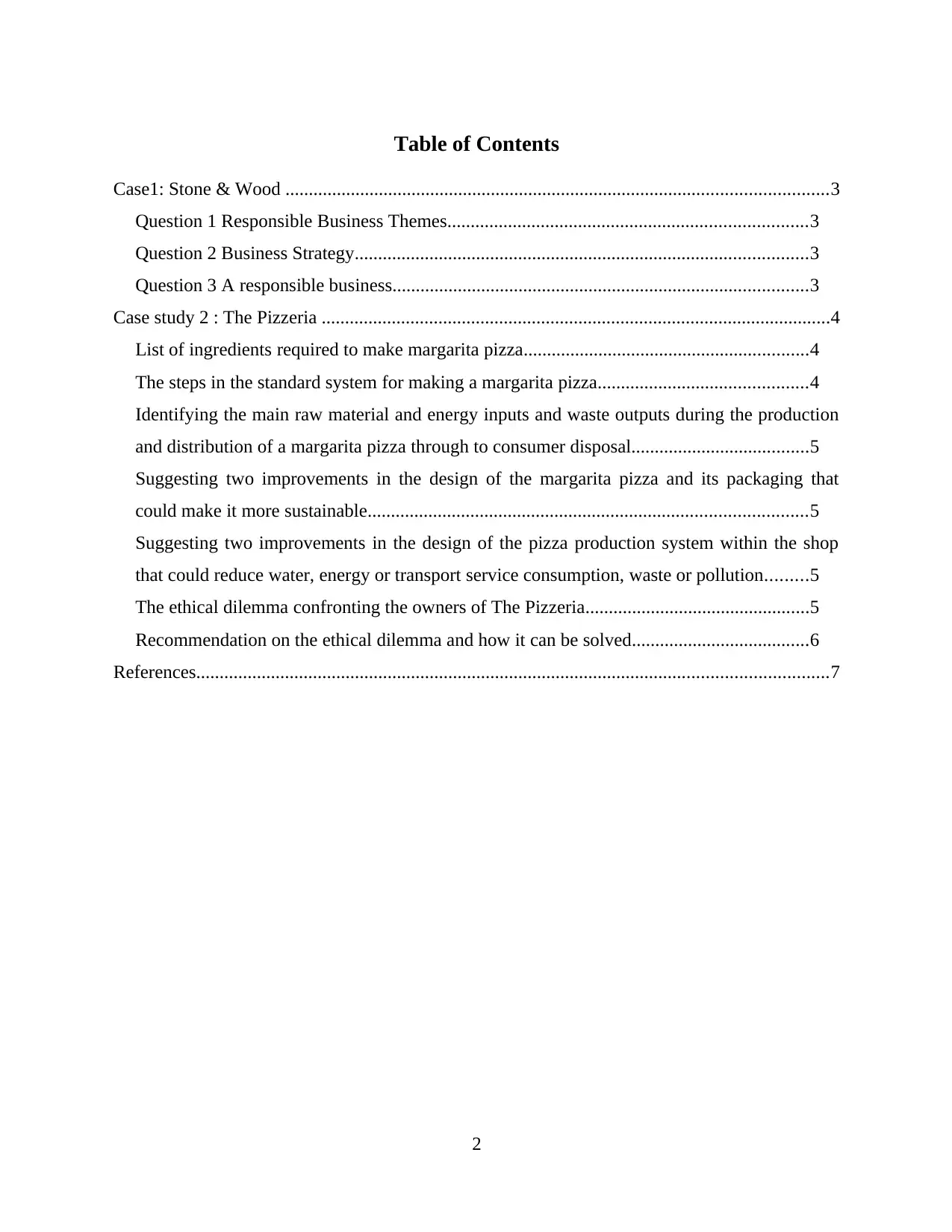
Table of Contents
Case1: Stone & Wood ....................................................................................................................3
Question 1 Responsible Business Themes.............................................................................3
Question 2 Business Strategy.................................................................................................3
Question 3 A responsible business.........................................................................................3
Case study 2 : The Pizzeria .............................................................................................................4
List of ingredients required to make margarita pizza.............................................................4
The steps in the standard system for making a margarita pizza.............................................4
Identifying the main raw material and energy inputs and waste outputs during the production
and distribution of a margarita pizza through to consumer disposal......................................5
Suggesting two improvements in the design of the margarita pizza and its packaging that
could make it more sustainable..............................................................................................5
Suggesting two improvements in the design of the pizza production system within the shop
that could reduce water, energy or transport service consumption, waste or pollution.........5
The ethical dilemma confronting the owners of The Pizzeria................................................5
Recommendation on the ethical dilemma and how it can be solved......................................6
References.......................................................................................................................................7
2
Case1: Stone & Wood ....................................................................................................................3
Question 1 Responsible Business Themes.............................................................................3
Question 2 Business Strategy.................................................................................................3
Question 3 A responsible business.........................................................................................3
Case study 2 : The Pizzeria .............................................................................................................4
List of ingredients required to make margarita pizza.............................................................4
The steps in the standard system for making a margarita pizza.............................................4
Identifying the main raw material and energy inputs and waste outputs during the production
and distribution of a margarita pizza through to consumer disposal......................................5
Suggesting two improvements in the design of the margarita pizza and its packaging that
could make it more sustainable..............................................................................................5
Suggesting two improvements in the design of the pizza production system within the shop
that could reduce water, energy or transport service consumption, waste or pollution.........5
The ethical dilemma confronting the owners of The Pizzeria................................................5
Recommendation on the ethical dilemma and how it can be solved......................................6
References.......................................................................................................................................7
2
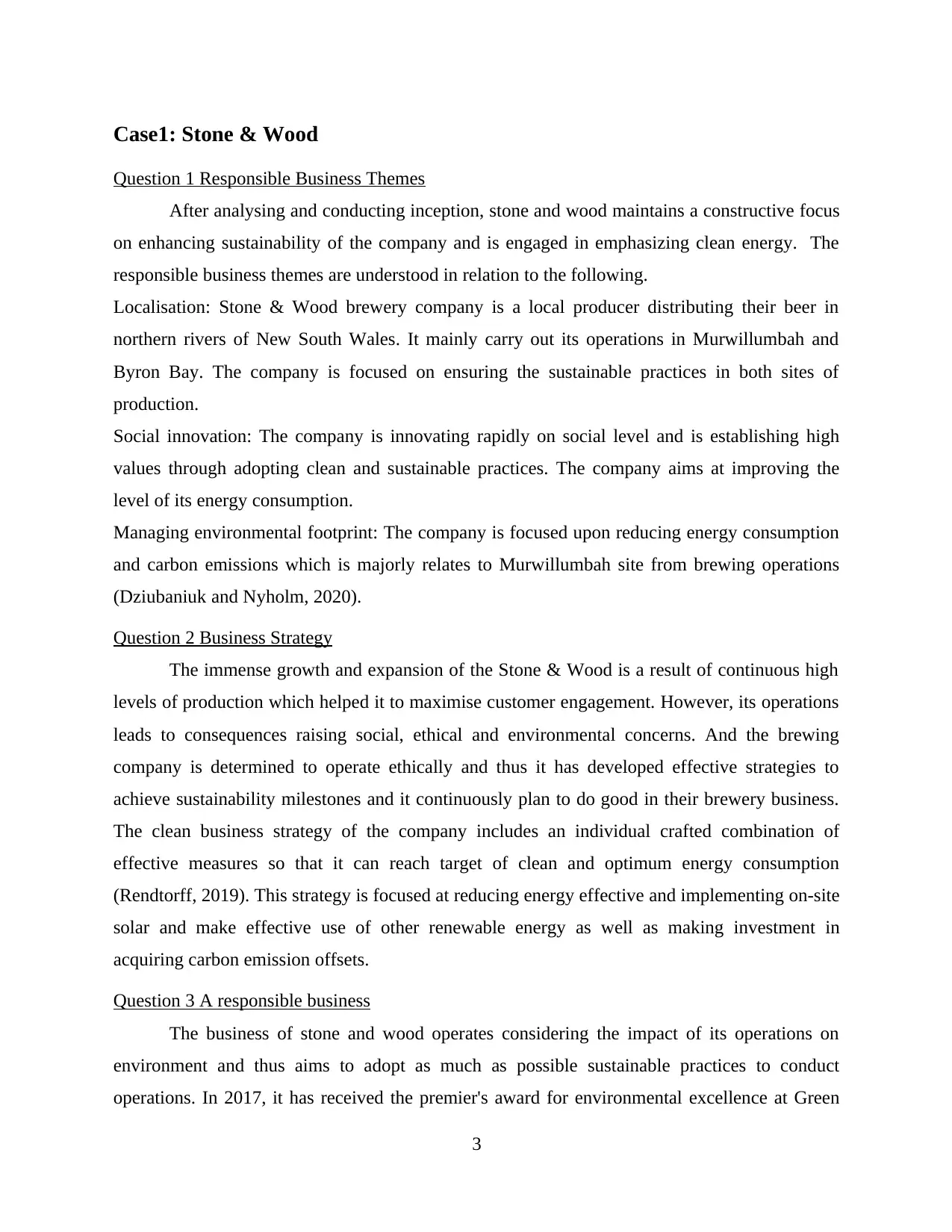
Case1: Stone & Wood
Question 1 Responsible Business Themes
After analysing and conducting inception, stone and wood maintains a constructive focus
on enhancing sustainability of the company and is engaged in emphasizing clean energy. The
responsible business themes are understood in relation to the following.
Localisation: Stone & Wood brewery company is a local producer distributing their beer in
northern rivers of New South Wales. It mainly carry out its operations in Murwillumbah and
Byron Bay. The company is focused on ensuring the sustainable practices in both sites of
production.
Social innovation: The company is innovating rapidly on social level and is establishing high
values through adopting clean and sustainable practices. The company aims at improving the
level of its energy consumption.
Managing environmental footprint: The company is focused upon reducing energy consumption
and carbon emissions which is majorly relates to Murwillumbah site from brewing operations
(Dziubaniuk and Nyholm, 2020).
Question 2 Business Strategy
The immense growth and expansion of the Stone & Wood is a result of continuous high
levels of production which helped it to maximise customer engagement. However, its operations
leads to consequences raising social, ethical and environmental concerns. And the brewing
company is determined to operate ethically and thus it has developed effective strategies to
achieve sustainability milestones and it continuously plan to do good in their brewery business.
The clean business strategy of the company includes an individual crafted combination of
effective measures so that it can reach target of clean and optimum energy consumption
(Rendtorff, 2019). This strategy is focused at reducing energy effective and implementing on-site
solar and make effective use of other renewable energy as well as making investment in
acquiring carbon emission offsets.
Question 3 A responsible business
The business of stone and wood operates considering the impact of its operations on
environment and thus aims to adopt as much as possible sustainable practices to conduct
operations. In 2017, it has received the premier's award for environmental excellence at Green
3
Question 1 Responsible Business Themes
After analysing and conducting inception, stone and wood maintains a constructive focus
on enhancing sustainability of the company and is engaged in emphasizing clean energy. The
responsible business themes are understood in relation to the following.
Localisation: Stone & Wood brewery company is a local producer distributing their beer in
northern rivers of New South Wales. It mainly carry out its operations in Murwillumbah and
Byron Bay. The company is focused on ensuring the sustainable practices in both sites of
production.
Social innovation: The company is innovating rapidly on social level and is establishing high
values through adopting clean and sustainable practices. The company aims at improving the
level of its energy consumption.
Managing environmental footprint: The company is focused upon reducing energy consumption
and carbon emissions which is majorly relates to Murwillumbah site from brewing operations
(Dziubaniuk and Nyholm, 2020).
Question 2 Business Strategy
The immense growth and expansion of the Stone & Wood is a result of continuous high
levels of production which helped it to maximise customer engagement. However, its operations
leads to consequences raising social, ethical and environmental concerns. And the brewing
company is determined to operate ethically and thus it has developed effective strategies to
achieve sustainability milestones and it continuously plan to do good in their brewery business.
The clean business strategy of the company includes an individual crafted combination of
effective measures so that it can reach target of clean and optimum energy consumption
(Rendtorff, 2019). This strategy is focused at reducing energy effective and implementing on-site
solar and make effective use of other renewable energy as well as making investment in
acquiring carbon emission offsets.
Question 3 A responsible business
The business of stone and wood operates considering the impact of its operations on
environment and thus aims to adopt as much as possible sustainable practices to conduct
operations. In 2017, it has received the premier's award for environmental excellence at Green
3
⊘ This is a preview!⊘
Do you want full access?
Subscribe today to unlock all pages.

Trusted by 1+ million students worldwide
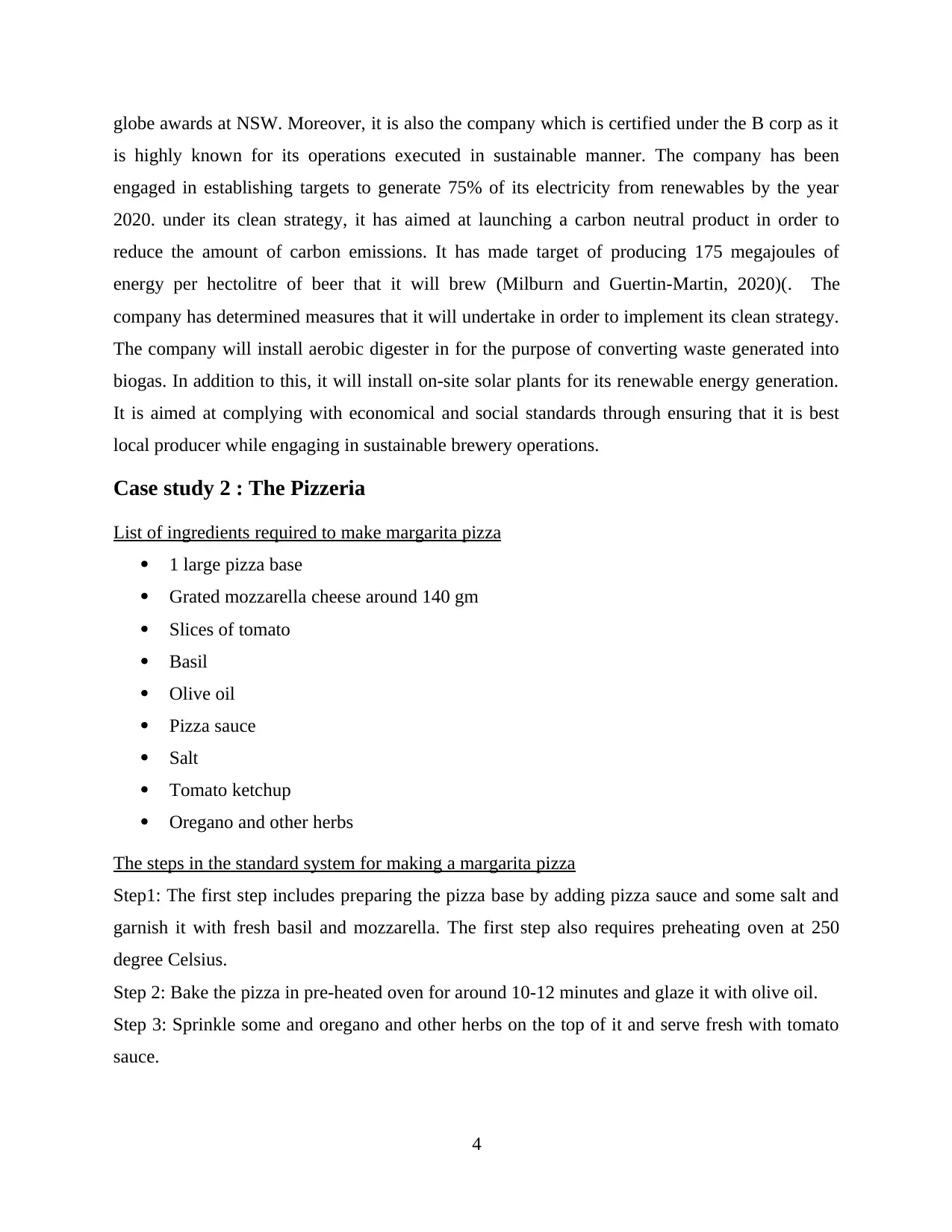
globe awards at NSW. Moreover, it is also the company which is certified under the B corp as it
is highly known for its operations executed in sustainable manner. The company has been
engaged in establishing targets to generate 75% of its electricity from renewables by the year
2020. under its clean strategy, it has aimed at launching a carbon neutral product in order to
reduce the amount of carbon emissions. It has made target of producing 175 megajoules of
energy per hectolitre of beer that it will brew (Milburn and Guertin-Martin, 2020)(. The
company has determined measures that it will undertake in order to implement its clean strategy.
The company will install aerobic digester in for the purpose of converting waste generated into
biogas. In addition to this, it will install on-site solar plants for its renewable energy generation.
It is aimed at complying with economical and social standards through ensuring that it is best
local producer while engaging in sustainable brewery operations.
Case study 2 : The Pizzeria
List of ingredients required to make margarita pizza
1 large pizza base
Grated mozzarella cheese around 140 gm
Slices of tomato
Basil
Olive oil
Pizza sauce
Salt
Tomato ketchup
Oregano and other herbs
The steps in the standard system for making a margarita pizza
Step1: The first step includes preparing the pizza base by adding pizza sauce and some salt and
garnish it with fresh basil and mozzarella. The first step also requires preheating oven at 250
degree Celsius.
Step 2: Bake the pizza in pre-heated oven for around 10-12 minutes and glaze it with olive oil.
Step 3: Sprinkle some and oregano and other herbs on the top of it and serve fresh with tomato
sauce.
4
is highly known for its operations executed in sustainable manner. The company has been
engaged in establishing targets to generate 75% of its electricity from renewables by the year
2020. under its clean strategy, it has aimed at launching a carbon neutral product in order to
reduce the amount of carbon emissions. It has made target of producing 175 megajoules of
energy per hectolitre of beer that it will brew (Milburn and Guertin-Martin, 2020)(. The
company has determined measures that it will undertake in order to implement its clean strategy.
The company will install aerobic digester in for the purpose of converting waste generated into
biogas. In addition to this, it will install on-site solar plants for its renewable energy generation.
It is aimed at complying with economical and social standards through ensuring that it is best
local producer while engaging in sustainable brewery operations.
Case study 2 : The Pizzeria
List of ingredients required to make margarita pizza
1 large pizza base
Grated mozzarella cheese around 140 gm
Slices of tomato
Basil
Olive oil
Pizza sauce
Salt
Tomato ketchup
Oregano and other herbs
The steps in the standard system for making a margarita pizza
Step1: The first step includes preparing the pizza base by adding pizza sauce and some salt and
garnish it with fresh basil and mozzarella. The first step also requires preheating oven at 250
degree Celsius.
Step 2: Bake the pizza in pre-heated oven for around 10-12 minutes and glaze it with olive oil.
Step 3: Sprinkle some and oregano and other herbs on the top of it and serve fresh with tomato
sauce.
4
Paraphrase This Document
Need a fresh take? Get an instant paraphrase of this document with our AI Paraphraser
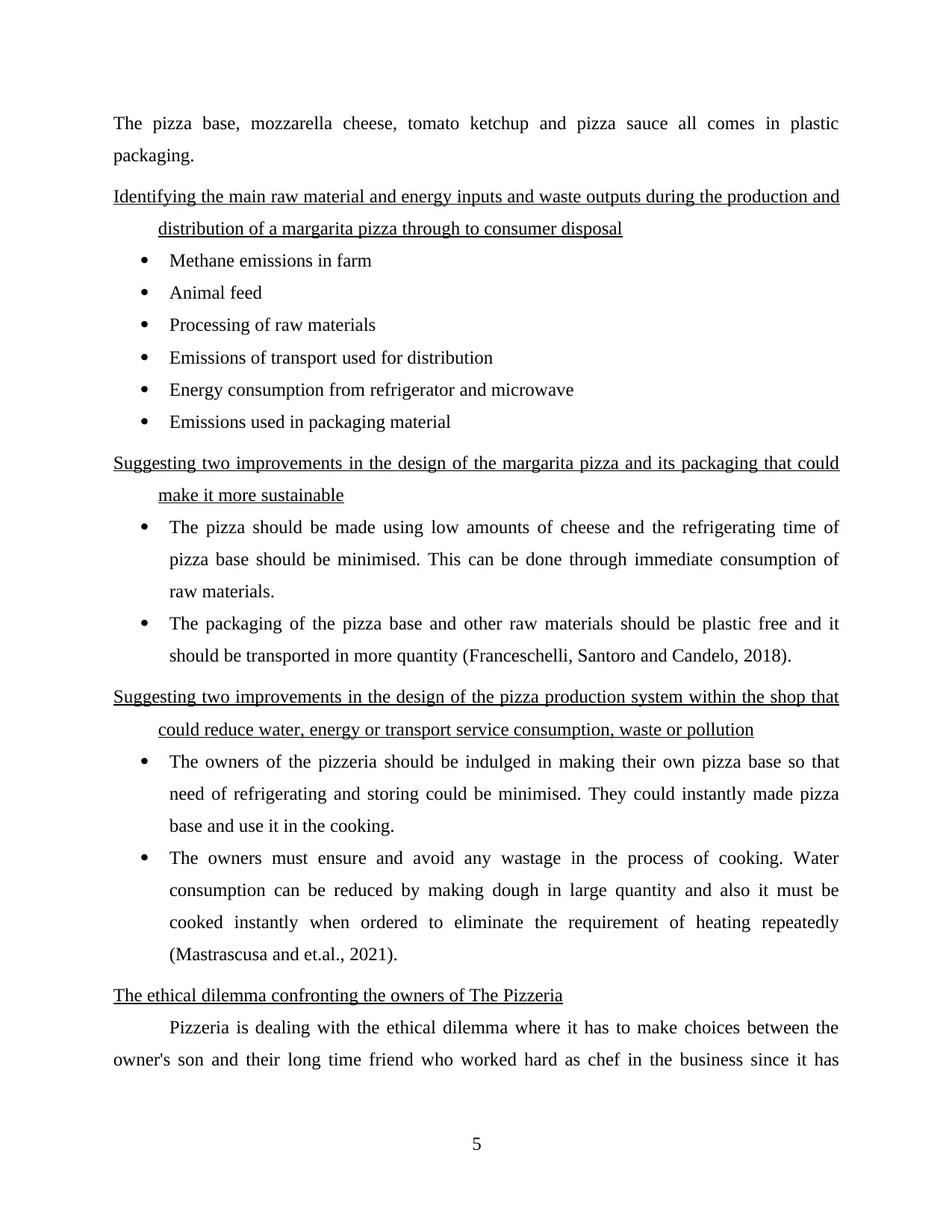
The pizza base, mozzarella cheese, tomato ketchup and pizza sauce all comes in plastic
packaging.
Identifying the main raw material and energy inputs and waste outputs during the production and
distribution of a margarita pizza through to consumer disposal
Methane emissions in farm
Animal feed
Processing of raw materials
Emissions of transport used for distribution
Energy consumption from refrigerator and microwave
Emissions used in packaging material
Suggesting two improvements in the design of the margarita pizza and its packaging that could
make it more sustainable
The pizza should be made using low amounts of cheese and the refrigerating time of
pizza base should be minimised. This can be done through immediate consumption of
raw materials.
The packaging of the pizza base and other raw materials should be plastic free and it
should be transported in more quantity (Franceschelli, Santoro and Candelo, 2018).
Suggesting two improvements in the design of the pizza production system within the shop that
could reduce water, energy or transport service consumption, waste or pollution
The owners of the pizzeria should be indulged in making their own pizza base so that
need of refrigerating and storing could be minimised. They could instantly made pizza
base and use it in the cooking.
The owners must ensure and avoid any wastage in the process of cooking. Water
consumption can be reduced by making dough in large quantity and also it must be
cooked instantly when ordered to eliminate the requirement of heating repeatedly
(Mastrascusa and et.al., 2021).
The ethical dilemma confronting the owners of The Pizzeria
Pizzeria is dealing with the ethical dilemma where it has to make choices between the
owner's son and their long time friend who worked hard as chef in the business since it has
5
packaging.
Identifying the main raw material and energy inputs and waste outputs during the production and
distribution of a margarita pizza through to consumer disposal
Methane emissions in farm
Animal feed
Processing of raw materials
Emissions of transport used for distribution
Energy consumption from refrigerator and microwave
Emissions used in packaging material
Suggesting two improvements in the design of the margarita pizza and its packaging that could
make it more sustainable
The pizza should be made using low amounts of cheese and the refrigerating time of
pizza base should be minimised. This can be done through immediate consumption of
raw materials.
The packaging of the pizza base and other raw materials should be plastic free and it
should be transported in more quantity (Franceschelli, Santoro and Candelo, 2018).
Suggesting two improvements in the design of the pizza production system within the shop that
could reduce water, energy or transport service consumption, waste or pollution
The owners of the pizzeria should be indulged in making their own pizza base so that
need of refrigerating and storing could be minimised. They could instantly made pizza
base and use it in the cooking.
The owners must ensure and avoid any wastage in the process of cooking. Water
consumption can be reduced by making dough in large quantity and also it must be
cooked instantly when ordered to eliminate the requirement of heating repeatedly
(Mastrascusa and et.al., 2021).
The ethical dilemma confronting the owners of The Pizzeria
Pizzeria is dealing with the ethical dilemma where it has to make choices between the
owner's son and their long time friend who worked hard as chef in the business since it has
5
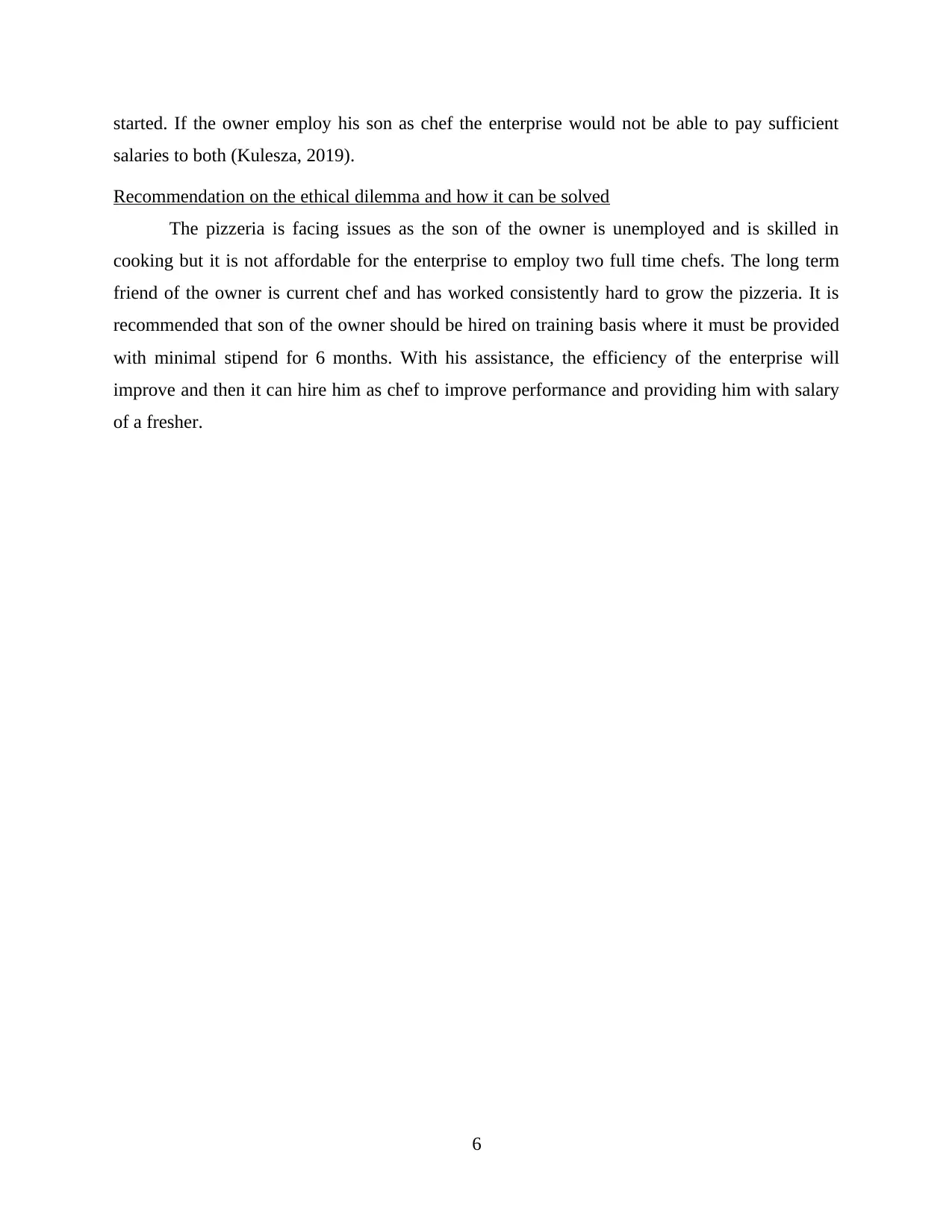
started. If the owner employ his son as chef the enterprise would not be able to pay sufficient
salaries to both (Kulesza, 2019).
Recommendation on the ethical dilemma and how it can be solved
The pizzeria is facing issues as the son of the owner is unemployed and is skilled in
cooking but it is not affordable for the enterprise to employ two full time chefs. The long term
friend of the owner is current chef and has worked consistently hard to grow the pizzeria. It is
recommended that son of the owner should be hired on training basis where it must be provided
with minimal stipend for 6 months. With his assistance, the efficiency of the enterprise will
improve and then it can hire him as chef to improve performance and providing him with salary
of a fresher.
6
salaries to both (Kulesza, 2019).
Recommendation on the ethical dilemma and how it can be solved
The pizzeria is facing issues as the son of the owner is unemployed and is skilled in
cooking but it is not affordable for the enterprise to employ two full time chefs. The long term
friend of the owner is current chef and has worked consistently hard to grow the pizzeria. It is
recommended that son of the owner should be hired on training basis where it must be provided
with minimal stipend for 6 months. With his assistance, the efficiency of the enterprise will
improve and then it can hire him as chef to improve performance and providing him with salary
of a fresher.
6
⊘ This is a preview!⊘
Do you want full access?
Subscribe today to unlock all pages.

Trusted by 1+ million students worldwide
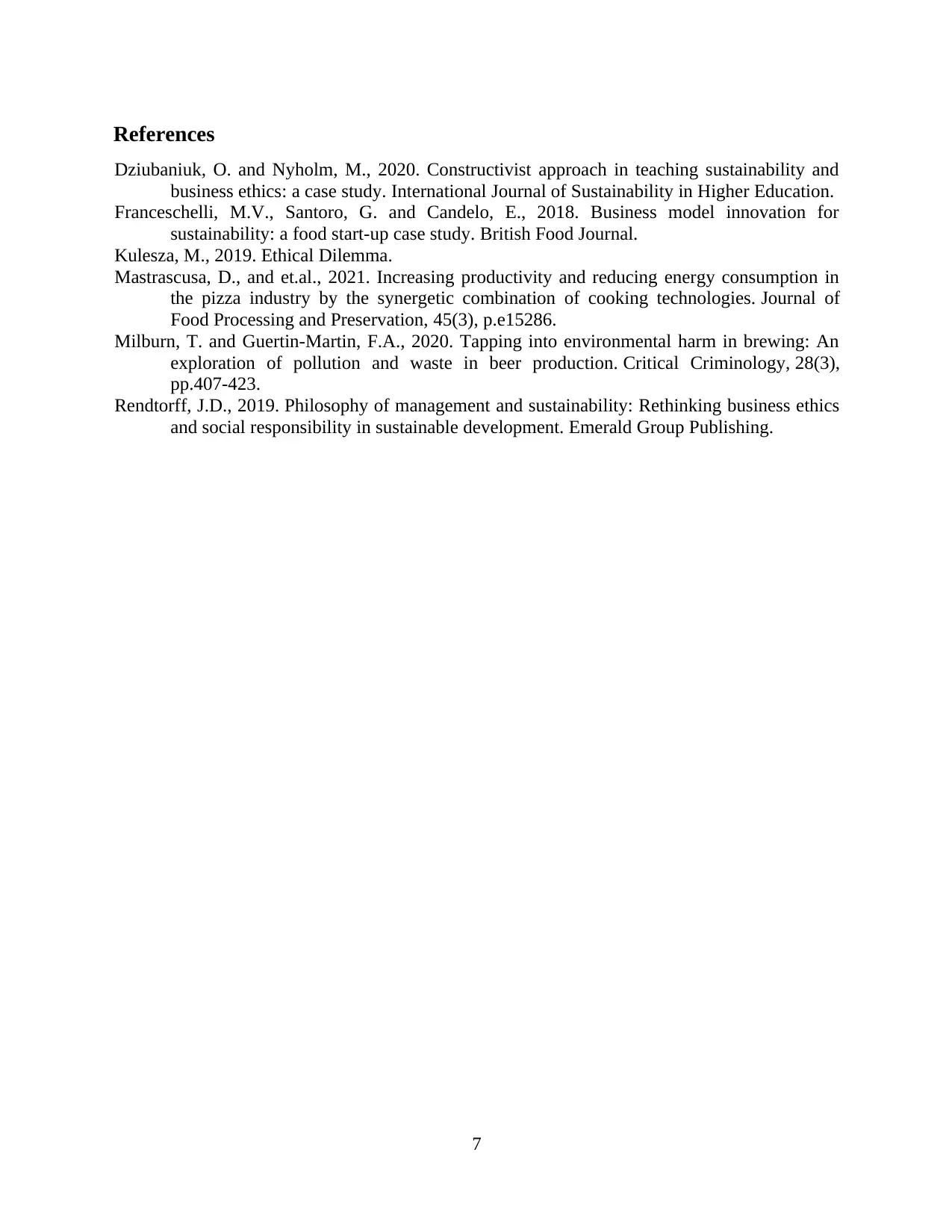
References
Dziubaniuk, O. and Nyholm, M., 2020. Constructivist approach in teaching sustainability and
business ethics: a case study. International Journal of Sustainability in Higher Education.
Franceschelli, M.V., Santoro, G. and Candelo, E., 2018. Business model innovation for
sustainability: a food start-up case study. British Food Journal.
Kulesza, M., 2019. Ethical Dilemma.
Mastrascusa, D., and et.al., 2021. Increasing productivity and reducing energy consumption in
the pizza industry by the synergetic combination of cooking technologies. Journal of
Food Processing and Preservation, 45(3), p.e15286.
Milburn, T. and Guertin-Martin, F.A., 2020. Tapping into environmental harm in brewing: An
exploration of pollution and waste in beer production. Critical Criminology, 28(3),
pp.407-423.
Rendtorff, J.D., 2019. Philosophy of management and sustainability: Rethinking business ethics
and social responsibility in sustainable development. Emerald Group Publishing.
7
Dziubaniuk, O. and Nyholm, M., 2020. Constructivist approach in teaching sustainability and
business ethics: a case study. International Journal of Sustainability in Higher Education.
Franceschelli, M.V., Santoro, G. and Candelo, E., 2018. Business model innovation for
sustainability: a food start-up case study. British Food Journal.
Kulesza, M., 2019. Ethical Dilemma.
Mastrascusa, D., and et.al., 2021. Increasing productivity and reducing energy consumption in
the pizza industry by the synergetic combination of cooking technologies. Journal of
Food Processing and Preservation, 45(3), p.e15286.
Milburn, T. and Guertin-Martin, F.A., 2020. Tapping into environmental harm in brewing: An
exploration of pollution and waste in beer production. Critical Criminology, 28(3),
pp.407-423.
Rendtorff, J.D., 2019. Philosophy of management and sustainability: Rethinking business ethics
and social responsibility in sustainable development. Emerald Group Publishing.
7
1 out of 7
Related Documents
Your All-in-One AI-Powered Toolkit for Academic Success.
+13062052269
info@desklib.com
Available 24*7 on WhatsApp / Email
![[object Object]](/_next/static/media/star-bottom.7253800d.svg)
Unlock your academic potential
Copyright © 2020–2025 A2Z Services. All Rights Reserved. Developed and managed by ZUCOL.




